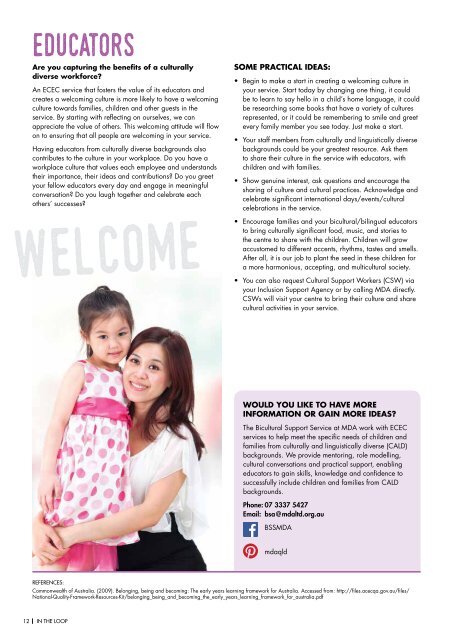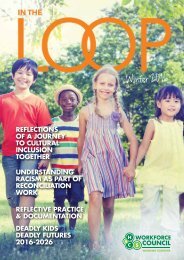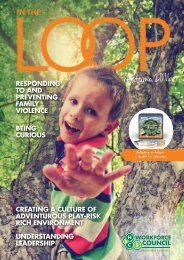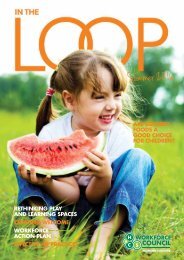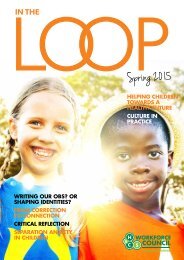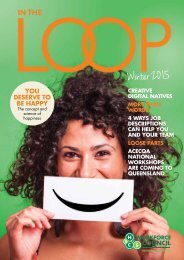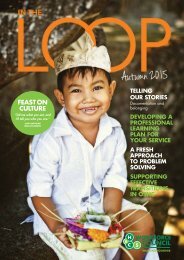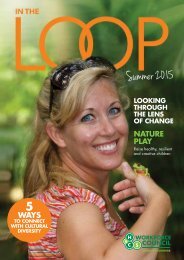The Loop December 2015 Web
You also want an ePaper? Increase the reach of your titles
YUMPU automatically turns print PDFs into web optimized ePapers that Google loves.
educators<br />
Are you capturing the benefits of a culturally<br />
diverse workforce?<br />
An ECEC service that fosters the value of its educators and<br />
creates a welcoming culture is more likely to have a welcoming<br />
culture towards families, children and other guests in the<br />
service. By starting with reflecting on ourselves, we can<br />
appreciate the value of others. This welcoming attitude will flow<br />
on to ensuring that all people are welcoming in your service.<br />
Having educators from culturally diverse backgrounds also<br />
contributes to the culture in your workplace. Do you have a<br />
workplace culture that values each employee and understands<br />
their importance, their ideas and contributions? Do you greet<br />
your fellow educators every day and engage in meaningful<br />
conversation? Do you laugh together and celebrate each<br />
others’ successes?<br />
SOME PRACTICAL IDEAS:<br />
• Begin to make a start in creating a welcoming culture in<br />
your service. Start today by changing one thing, it could<br />
be to learn to say hello in a child’s home language, it could<br />
be researching some books that have a variety of cultures<br />
represented, or it could be remembering to smile and greet<br />
every family member you see today. Just make a start.<br />
• Your staff members from culturally and linguistically diverse<br />
backgrounds could be your greatest resource. Ask them<br />
to share their culture in the service with educators, with<br />
children and with families.<br />
• Show genuine interest, ask questions and encourage the<br />
sharing of culture and cultural practices. Acknowledge and<br />
celebrate significant international days/events/cultural<br />
celebrations in the service.<br />
welcome<br />
• Encourage families and your bicultural/bilingual educators<br />
to bring culturally significant food, music, and stories to<br />
the centre to share with the children. Children will grow<br />
accustomed to different accents, rhythms, tastes and smells.<br />
After all, it is our job to plant the seed in these children for<br />
a more harmonious, accepting, and multicultural society.<br />
• You can also request Cultural Support Workers (CSW) via<br />
your Inclusion Support Agency or by calling MDA directly.<br />
CSWs will visit your centre to bring their culture and share<br />
cultural activities in your service.<br />
WOULD YOU LIKE TO HAVE MORE<br />
INFORMATION OR GAIN MORE IDEAS?<br />
<strong>The</strong> Bicultural Support Service at MDA work with ECEC<br />
services to help meet the specific needs of children and<br />
families from culturally and linguistically diverse (CALD)<br />
backgrounds. We provide mentoring, role modelling,<br />
cultural conversations and practical support, enabling<br />
educators to gain skills, knowledge and confidence to<br />
successfully include children and families from CALD<br />
backgrounds.<br />
Phone: 07 3337 5427<br />
Email: bsa@mdaltd.org.au<br />
BSSMDA<br />
mdaqld<br />
REFERENCES:<br />
Commonwealth of Australia. (2009). Belonging, being and becoming: <strong>The</strong> early years learning framework for Australia. Accessed from: http://files.acecqa.gov.au/files/<br />
National-Quality-Framework-Resources-Kit/belonging_being_and_becoming_the_early_years_learning_framework_for_australia.pdf<br />
12<br />
IN THE LOOP


